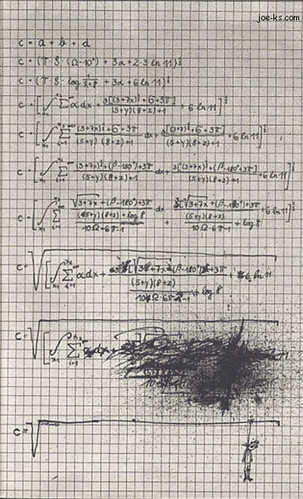Maths - Not Always About Thousands of Formulae (1)
 Many people have an impression that mathematics is about hard and meaningless formulae. Lots and lots of formulae. Whenever someone mentions that he or she goes to a maths competition, the others inevitably conjure an image of that person cranking thousands of convoluted formulae and sophisticated theorems and doing things like 10-digit by 10-digit multiplication. Meanwhile, they might also assume that in order to enter a maths competition, one must be equipped with an arsenal of bombastic formulae and be able to memorize the logarithm table off their head.
Many people have an impression that mathematics is about hard and meaningless formulae. Lots and lots of formulae. Whenever someone mentions that he or she goes to a maths competition, the others inevitably conjure an image of that person cranking thousands of convoluted formulae and sophisticated theorems and doing things like 10-digit by 10-digit multiplication. Meanwhile, they might also assume that in order to enter a maths competition, one must be equipped with an arsenal of bombastic formulae and be able to memorize the logarithm table off their head.
However, those impressions are far from the truth.
The truth is, unless you are doing a hardcore mathematical course in university, maths is rarely about formulae and complicated calculations. To be precise, recreational and competitive mathematics is accessible to anyone with a grounding in the most basic mathematical education. As long as you know how to count and some basic high-school maths, you are able to tackle many seemingly impossible question. In fact, you would be surprised at how many questions in mathematical competition are actually solvable using high-school maths most of us are familiar with.
For example, consider this mathematical puzzle:
Alice and Bob alternately choose a number from among 1 to 9, with no replacement. The first to obtain any 3 numbers which sum to 15 wins. Does Alice (the first player) have a winning strategy?At the first glance, it seems to be "yet another complicated mathematical analysis do-able only by crazy and eat-full-nothing-to-do-mathematician" sort of question. Also, what in the world does it mean by "does Alice have a winning strategy"?! How do we go about attempting the question at all? It is not even asking for any sort of answer! How do we even calculate "is there a winning strategy"?
[Provided by Chiun Lin in ReCom. Spoiler Warning: Solution in the original page]
However, as we shall see later, some loosening-the-screw and out-of-the-box thinking will help us tackle the question without any complicated formulae or theorems. Before I discuss the solution in the next post, you could try to tackle this problem by yourself. Remember, absolutely no theorems or formulae are needed.
[To be continued...]
[4 Jan: Continued here]







4 comments:
lol @ 'recreational' maths
ChangYang,
Is it...like playing tic-tae-toc.. whatever you call it..
816
357
492
In this 3X3 square, horizontal, diagonal or vertical, the sum will be 15...
If I am Alice, I would pick number 5 1st, then I will have many combinations to allow me to reach the end point :15
So I will pick No. 5 1st...
Hope I am right ;P
Woon Pang
I shall be an extremist and declare that mathematics is not about formulae nor equations, but IDEAS.
But I'm scooting off on a tangent here :P
Haha Ka Lip, it's actually a formal "genre" or field of maths: Wiki article. :P
Wow Woon Pang, you are almost there!! :D The term "winning strategy" might have confused you. The question should be better phrased as "Is there any way Alice could force a win?" Proceeding from what you have got there, it's rather easy. :)
Bluez: Agreed! Ideas and concepts. And logics, I guess.
Post a Comment